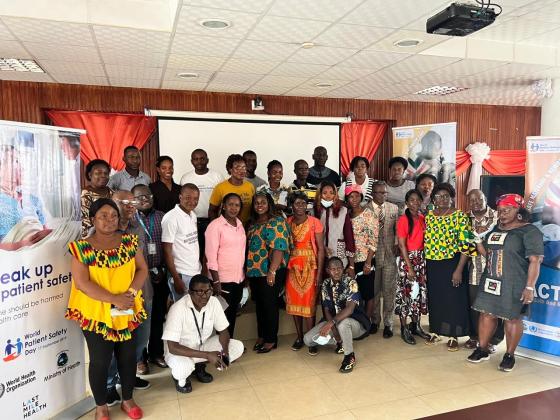Liberia: Last Mile Health, Partners Commemorate World Patient Day

Participants pose after the commemoration of the Fourth Annual World Patient Safety Day.
— Launches Adverse Event Reporting
The Last Mile Health (LMH) in collaboration with the Government of Liberia through the Ministry of Health, mainly the Unit of Health Quality Management and the World Health Organization (WHO) recently joined the global community to commemorate the Fourth Annual World Patient Safety Day (WPSD) in Liberia.
The day is in alignment with the decision at the 72nd World Health Assembly for member countries. The day is commemorated on September 17th every year.
The main objectives of observance of the day are to increase public awareness, enhance global understanding, and call for solidarity and unity by all countries, including Liberia and international partners to increase patient safety and reduce patient harm during healthcare delivery.
This year’s WPSD was celebrated under the theme, "Medication Safety: Medication without Harm." This specifically draws the attention of the national government to improve the system to support safe medication and address unsafe practices.
Last Mile Health Medical Director, Dr. Lekilay G. Tehmeh, who spoke at the celebration held at the Ministry of Health, said the celebration or campaign is intended to help accelerate progress in improving patient safety, of which medication safety is one of the most important aspects.
He disclosed that there has been limited progress on medication safety in Liberia due to innumerable factors not limited to porous borders with lots of counterfeit medications circulating on the Liberian market, street peddlers with access to mostly poor quality and inadequately stored medicines, limited capacity to ensure the right products at the point of care, low prescribing, preparation and dispensing capacity, among others.
Also, Tehmeh cited a recently published OECD health working group paper by Katherine de Bienassis et al titled "The Economics of Medication Safety: Improving Medication Safety Through Collective, Real-time Learning."
This reports a number of factors, including an older population, increased medication access at the point of sale, and an increased number of approved medications, among others.
Mrs. Comfort King-Gbaie, Quality Assurance Coordinator at MOH and Dr. Tehmeh raised their hands in solidarity with the launch of the WHO Adverse Event Reporting.
"So this all causes increased medication use that definitely results in an increased chance by which people get harm from medication used. So, medication-related harm events are common in all settings of healthcare—primary healthcare level, secondary level, among others," Tehmeh said.
He cited a recent OECD report that resulted in $ 1.4 billion in losses as well as the cause of harm from wrongful use of medication or prescriptions.
According to him, healthcare workers' safety is equally important, therefore healthcare facilities need to provide a working environment that is healthy and safe.
I’m very excited and, on behalf of LMH, would like to say we are in this with you, including the Ministry of Health and all of the pharmaceutical agencies, the LMHRA and others that are working to improve medication in Liberia."
Serving as keynote speaker, Dr. Menmon P.Z. Dunah, Registrar General and Chief Executive Officer of the Liberia Pharmacy Board, said medication errors harm patients and expose health professionals to civil liability and possible criminal prosecution.
He added that medication harm can be the result of an error, accident, or communication problem, including healthcare professionals prescribing and administering medicine in ways that increase the risk of harm to consumers; the complexity of medicine naming, dosing, indications, duration of therapy, monitoring, precautions, and interactions; and consumers misunderstanding why and how to use their medicines.
Therefore, Dunnah said, healthcare workers must apply all their medical professional expertise to minimizing or reducing medication errors in total medication use and improve patient safety in the healthcare system.
He noted that patient safety is one of the most important components of health care delivery, which is essential to achieving universal health coverage (UHC) and moving towards the UN Sustainable Development Goals (SDGs), and Liberia is no exception to this global initiative.
"Medication safety is the responsibility of all members of the healthcare team. I call on all health workers to be more vigilant and robust in applying quality care that will reduce medication harm and improve patient safety," Dunnah added.
Earlier, the World Health Organization's Health System Strengthening Officer, Moses B. Bolongei, thanked Last Mile Health and the MOH, as well as other partners, for their tireless efforts toward improving patient safety at different levels.
He also stressed the need for healthcare workers to prioritize patient safety, of which medication safety is critical because everyone here needs medication.
Bolongei also used the occasion to pledge the World Health Organization’s unwavering support in collaborating with the health ministry and all partners, including healthcare institutions, to ensure that the medication without harm apps and patient rights chapter are implemented, and monitored in order to reduce patient harm and promote patient safety.
Meanwhile, the celebration was also marked by the launch of Adverse Event Reporting at John F. Kennedy Hospital and ELWA Hospital.
